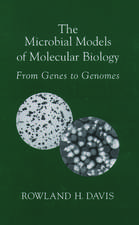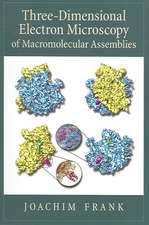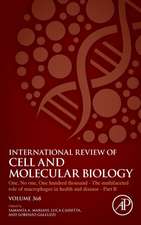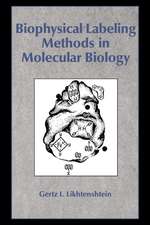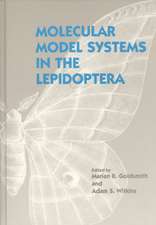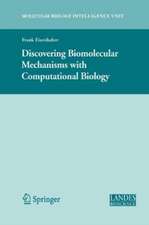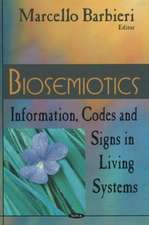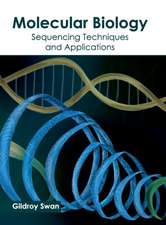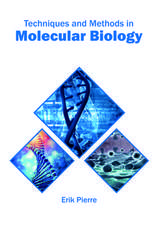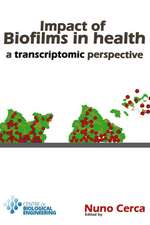Data Mining Techniques for the Life Sciences: Methods in Molecular Biology, cartea 1415
Editat de Oliviero Carugo, Frank Eisenhaberen Limba Engleză Paperback – 21 apr 2018
Authoritative and cutting-edge, Data Mining Techniques for the Life Sciences, Second Edition aims to ensure successful results in the further study of this vital field.
| Toate formatele și edițiile | Preț | Express |
|---|---|---|
| Paperback (3) | 722.53 lei 6-8 săpt. | |
| Springer – 21 apr 2018 | 722.53 lei 6-8 săpt. | |
| Springer Us – 6 mai 2023 | 826.48 lei 6-8 săpt. | |
| Humana Press Inc. – 23 aug 2016 | 935.67 lei 6-8 săpt. | |
| Hardback (3) | 664.44 lei 6-8 săpt. | |
| Humana Press Inc. – 14 dec 2009 | 664.44 lei 6-8 săpt. | |
| Springer – 27 apr 2016 | 1015.20 lei 6-8 săpt. | |
| Springer Us – 5 mai 2022 | 1289.75 lei 6-8 săpt. |
Din seria Methods in Molecular Biology
- 9%
 Preț: 791.59 lei
Preț: 791.59 lei - 23%
 Preț: 598.56 lei
Preț: 598.56 lei - 20%
 Preț: 882.95 lei
Preț: 882.95 lei -
 Preț: 252.04 lei
Preț: 252.04 lei - 5%
 Preț: 802.69 lei
Preț: 802.69 lei - 5%
 Preț: 729.61 lei
Preț: 729.61 lei - 5%
 Preț: 731.43 lei
Preț: 731.43 lei - 5%
 Preț: 741.30 lei
Preț: 741.30 lei - 5%
 Preț: 747.16 lei
Preț: 747.16 lei - 15%
 Preț: 663.45 lei
Preț: 663.45 lei - 18%
 Preț: 1025.34 lei
Preț: 1025.34 lei - 5%
 Preț: 734.57 lei
Preț: 734.57 lei - 18%
 Preț: 914.20 lei
Preț: 914.20 lei - 15%
 Preț: 664.61 lei
Preț: 664.61 lei - 15%
 Preț: 654.12 lei
Preț: 654.12 lei - 18%
 Preț: 1414.74 lei
Preț: 1414.74 lei - 5%
 Preț: 742.60 lei
Preț: 742.60 lei - 20%
 Preț: 821.63 lei
Preț: 821.63 lei - 18%
 Preț: 972.30 lei
Preț: 972.30 lei - 15%
 Preț: 660.49 lei
Preț: 660.49 lei - 5%
 Preț: 738.41 lei
Preț: 738.41 lei - 18%
 Preț: 984.92 lei
Preț: 984.92 lei - 5%
 Preț: 733.29 lei
Preț: 733.29 lei -
 Preț: 392.58 lei
Preț: 392.58 lei - 5%
 Preț: 746.26 lei
Preț: 746.26 lei - 18%
 Preț: 962.66 lei
Preț: 962.66 lei - 23%
 Preț: 860.21 lei
Preț: 860.21 lei - 15%
 Preț: 652.64 lei
Preț: 652.64 lei - 5%
 Preț: 1055.50 lei
Preț: 1055.50 lei - 23%
 Preț: 883.85 lei
Preț: 883.85 lei - 19%
 Preț: 491.88 lei
Preț: 491.88 lei - 5%
 Preț: 1038.84 lei
Preț: 1038.84 lei - 5%
 Preț: 524.15 lei
Preț: 524.15 lei - 18%
 Preț: 2122.34 lei
Preț: 2122.34 lei - 5%
 Preț: 1299.23 lei
Preț: 1299.23 lei - 5%
 Preț: 1339.10 lei
Preț: 1339.10 lei - 18%
 Preț: 1390.26 lei
Preț: 1390.26 lei - 18%
 Preț: 1395.63 lei
Preț: 1395.63 lei - 18%
 Preț: 1129.65 lei
Preț: 1129.65 lei - 18%
 Preț: 1408.26 lei
Preț: 1408.26 lei - 18%
 Preț: 1124.92 lei
Preț: 1124.92 lei - 18%
 Preț: 966.27 lei
Preț: 966.27 lei - 5%
 Preț: 1299.99 lei
Preț: 1299.99 lei - 5%
 Preț: 1108.51 lei
Preț: 1108.51 lei - 5%
 Preț: 983.72 lei
Preț: 983.72 lei - 5%
 Preț: 728.16 lei
Preț: 728.16 lei - 18%
 Preț: 1118.62 lei
Preț: 1118.62 lei - 18%
 Preț: 955.25 lei
Preț: 955.25 lei - 5%
 Preț: 1035.60 lei
Preț: 1035.60 lei - 18%
 Preț: 1400.35 lei
Preț: 1400.35 lei
Preț: 722.53 lei
Preț vechi: 903.16 lei
-20% Nou
Puncte Express: 1084
Preț estimativ în valută:
138.27€ • 142.84$ • 115.08£
138.27€ • 142.84$ • 115.08£
Carte tipărită la comandă
Livrare economică 25 martie-08 aprilie
Preluare comenzi: 021 569.72.76
Specificații
ISBN-13: 9781493980819
ISBN-10: 1493980815
Ilustrații: XIII, 552 p. 97 illus., 84 illus. in color.
Dimensiuni: 178 x 254 mm
Greutate: 0.97 kg
Ediția:Softcover reprint of the original 2nd ed. 2016
Editura: Springer
Colecția Humana
Seria Methods in Molecular Biology
Locul publicării:New York, NY, United States
ISBN-10: 1493980815
Ilustrații: XIII, 552 p. 97 illus., 84 illus. in color.
Dimensiuni: 178 x 254 mm
Greutate: 0.97 kg
Ediția:Softcover reprint of the original 2nd ed. 2016
Editura: Springer
Colecția Humana
Seria Methods in Molecular Biology
Locul publicării:New York, NY, United States
Cuprins
Update on Genomic Databases and Resources at the National Center for Biotechnology Information.- Protein Structure Databases.- The MIntAct Project and Molecular Interaction Databases.- Applications of Protein Thermodynamic Database for Understanding Protein Mutant Stability and Designing Stable Mutants.- Classification and Exploration of 3D Protein Domain Interactions using Kbdock.- Data Mining of Macromolecular Structures.- Criteria to Extract High Quality Protein Data Bank Subsets for Structure Users.- Homology-based Annotation of Large Protein Datasets.- Identification and Correction Of Erroneous Protein Sequences in Public Databases.- Improving the Accuracy of Fitted Atomic Models in Cryo-EM Density Maps Of Protein Assemblies Using Evolutionary Information From Aligned Homologous Proteins.- Systematic Exploration of an Efficient Amino Acid Substitution Matrix, MIQS.- Promises and Pitfalls of High Throughput Biological Assays.- Optimizing RNA-seq Mapping with STAR.- Predicting Conformational Disorder.- Classification of Protein Kinases Influenced By Conservation of Substrate Binding Residues.- Spectral-Statistical Approach for Revealing Latent Regular Structures in DNA Sequence.- Protein Crystallizability.- Analysis and Visualization of ChIP-Seq and RNA-Seq Sequence Alignments using ngs.plot.- Data Mining with ontologies.- Functional Analysis of Metabolomics Data.- Bacterial Genomics Data Analysis in the Next-Generation Sequencing Era.- A Broad Overview of Computational Methods for Predicting the Pathophysiological Effects of Non-Synonymous Variants.- Recommendation Techniques for Drug-Target Interaction Prediction and Drug-Repositioning.- Protein Residue Contacts and Prediction Methods.- The Recipe for Protein Sequence-Based Function Prediction and its Implementation in the Annotator Software Environment.- Big Data, Evolution, and Metagenomes: Predicting Disease from Gut Microbiota Codon Usage Profiles.- Big Data in Plant Science: Resources and Data Mining Tools for Plant Genomics and Proteomics.
Recenzii
“The style of the book and the assortment of topics which are presented make it accessible to a wide range of audiences, from undergraduates to established researchers, and from a variety of backgrounds, biologists, chemists, bioinformaticians. This collection of articles highlighting the state of the art for protein analyses, can also be used as a brief yet thorough starting point for post-graduate projects.” (Irina Ioana Mohorianu, zbMATH 1353.92002, 2017)
Textul de pe ultima copertă
High throughput sequencing (HTS) technologies have conquered the genomics and epigenomics worlds. The applications of HTS methods are wide, and can be used to sequence everything from whole or partial genomes, transcriptomes, non-coding RNAs, ribosome profiling, to single-cell sequencing. Having such diversity of alternatives, there is a demand for information by research scientists without experience in HTS that need to choose the most suitable methodology or combination of platforms and to define their experimental designs to achieve their specific objectives. Field Guidelines for Genetic Experimental Designs in High-Throughput Sequencing
Caracteristici
Includes cutting-edge methods and protocols Provides step-by-step detail essential for reproducible results Contains key notes and implementation advice from the experts Includes supplementary material: sn.pub/extras





